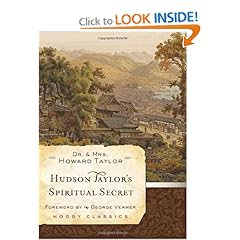I have been wanting to read Hudson Taylor’s Spiritual Secret for a while. I read a short biography on Hudson Taylor a while ago and have been wanting to read a longer biography since then. It is a public domain book, but I have not been able to find a good copy of it. Project Gutenburg doesn’t have it. Christian Classic Ethereal Library only has Microsoft Reader Format. (When looking around for this post I did find a web version which could be converted for kindle.) I was looking for something else on Amazon in the Kindle store and Hudson Taylor’s Spiritual Secret was in the suggested other books section. It was not free on kindle (although only $4) but it was a Moody Classics version, so I assumed it would be formated fairly well and relatively free of mistakes. Some public domain books are scanned in and can have a fair amount of typos if not edited well.
 The editing seems to be fairly good on this one, no mistakes or mispellings that I have noticed, but the formating is not great. There are a lot of random spaces in the middle of words, not a big deal, but if I am going to buy it instead of just find a free copy, I expect that the formating would be better.
The editing seems to be fairly good on this one, no mistakes or mispellings that I have noticed, but the formating is not great. There are a lot of random spaces in the middle of words, not a big deal, but if I am going to buy it instead of just find a free copy, I expect that the formating would be better.
That being said, the content is good.
What is most striking to me is the difference in Hudson Taylor’s faith and our own. Hudson Taylor, from Britain, was one of the first modern missionaries into the interior of China. He eventually led an organization of 800 missionaries working in 500 location throughout the interior of China.
When you read about these early missionaries, they clearly love their families. But they thought their work more important than protecting their families from all harm. Hudson Taylor buried a wife and a number of his children in China. I know people that are concerned about their children just going to public school. But Taylor (and his wife) were more concerned about the mission they have been given. They grieved deeply. Taylor speaks of reminding himself 20 times a day of the passage with the woman at the well in John 4:13-14 “Jesus answered, “œEveryone who drinks this water will get thirsty again. But no one who drinks the water I give will ever be thirsty again. The water I give is like a flowing fountain that gives eternal life.” (CEV). Each time he would remind himself of the passage after his wife’s death he would be comforted.
There are two important things I learned in this book. One was Taylor’s point about big and small work and our responsibility. Taylor was writing to a friend and was explaining that he was not concerned about the bigness of the task, because he did not choose the task, God did. So if Taylor did not choose to do the task, but simply was the servant of God, then he was not responsible for it, nor should he get glory for it. He compares himself to Taylor’s own servant.
“It little matters to my servant whether I send him to buy a few cash worth of things, or the most expensive articles. In either case he looks to me for the money and brings me his purchases. So, if God should place me in serious perplexity, must He not give me much guidance; in positions of great difficulty, much grace; in circumstances of great pressure and trial, much strength? No fear that His resources will prove unequal to the emergency! And His resources are mine, for He is mine, and is with me and dwells in me.”
The second, big point is related. He did not think that God’s grace in his life, to persevere and carry to through the mission that God had given him, should be unusual. He said, “Nor should we look upon this experience, these truths, as for the few. They are the birthright of every child of God, and no one can dispense with them without dishonouring our Lord. The only power for deliverance from sin or for true service is Christ.” He was talking about the grace of salvation as well as the peace that comes from following God.
It is difficult to read books like this and not be challenged to try and do more. I heard John Ortberg speak this week and he said (my paraphrase), “God does not mass produce his disciples, but hand crafts them one by one.” God does not expect me to be Hudson Taylor. But God does expect me to be obedient to be what God wants me to be. I think that in the end is Hudson Taylor’s spiritual secret. It is God, not us, that provides the strength to accomplish his will.